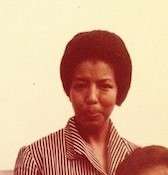Senedu Gebru

Woizero Senedu Gebru (ሰንዱ ገብሩ) (13 January 1916 – 20 April 2009) was an Ethiopian educator, writer and politician. In 1957, she became the first Ethiopian woman elected to Parliament.
Early life and resistance
Gebru was born on 13 January 1916 in Mennagesha.[1] Her father, Gebru Desta, was a European-educated writer and former mayor of Addis Ababa and briefly president of the senate. Her mother, Weyzero Kasaye Yelamtu, was an Ethiopian Othodox Christian and raised her in the faith.[2] She was educated locally at the Swedish Mission School before being sent to Switzerland in 1928 for higher studies. She did not like the school, so she was sent to a school in Montmirail, France, where she learned French and English. She also discovered a love for literature, and earned a degree in the subject at Lausanne University in Switzerland. In 1932, she moved back to Ethiopia to find a position as a teacher at the St. George School in Addis Ababa and married for the first time.[1] In addition to teaching, she interpreted for foreign journalists.[2]
Gebru became politically active in the 1930s resisting the Italian occupation of Ethiopia. Along with her brothers, she was involved in the opposition movement led by Haile Selassie.[3] She moved to Goré in Illubabor Province, where she joined with 100 cadets from a military academy and received some military training. Her group traveled to Neqemte, where she tried to arouse resistance to the Italians and was nearly captured. Gebru moved back to Goré, where she joined the Black Lions and established a Red Cross Unit after receiving some medical training. Gebru served as an informant for the Black Lions about Italian troop movements. Eventually, after catching pneumonia, she was captured by the Italians and interrogated. Meanwhile, her brother was killed on 19 February 1937.[1] She later wrote a play about this event.[2] Her rebellious behavior resulted in her being imprisoned on the Italian island of Asinara along with her father and sister.[4] She was repatriated to Ethiopia in 1939.[2]
Literary and political career
After Gebru returned to Ethiopia, she found a job at the Weyzero Sihïn school in Desé in 1941.[1] Gebru was appointed assistant director of the first girls' school in Ethiopia, the Empress Etege School, in 1943. She became headmistress two years later, a first in Ethiopian history.[4] She instituted a number of innovations, such as taking girls for picnics on Mount Intoto and having them perform plays she wrote to enhance their public speaking abilities.[5]
She was a writer in the Amharic language, and in 1956 published a collection of short stories, songs and poems entitled YaLebbe Meshaf (Book of My Heart).[4] This was the only book she would write, although she produced a number of popular plays such as Keyekketit quenoch (Days in February).[1] The following year, she was elected to the Parliament of Ethiopia, the first woman to do so.[4] She was named vice president of the Chamber of Deputies on 22 November.[6] She advocated complete parity between men and women and institution of the Civil Code.[7] She served four years in Parliament and tried to end flogging of criminals, although this met some resistance.[1] After her stint in Parliament, Gebru served in a number of important positions, such as the leader of the Ethiopian Red Cross and secretary-general of the Ministry of Social Affairs.[4]
Later life
Gebru was married three times. Her third husband, Aseffa Lemma, was appointed ambassador to Germany in 1968. She followed him to Bonn as an educational attache. The outbreak of the Ethiopian Civil War in 1974 caused him to seek exile there, but she returned to Ethiopia. She continued to write, and donated some plays to the Institute of Ethiopian Studies at the Addis Ababa University. Gebru was a regular contributor to the "women's column" in the Amharic newspaper Addis Zemen.[1] Her son, Samuel Aseffa, was ambassador to the United States.[2]
Gebru died on 20 April 2009.[7]
References
- 1 2 3 4 5 6 7 Molvaer, Reidulf (1997). "Siniddu Gebru: Pioneer Woman Writer, Feminist, Patriot, Educator, and Politician". Northeast African Studies. 4 (3): 61–75. JSTOR 41937633.
- 1 2 3 4 5 Pankhurst, Richard (2012). Akyeampong, Emmanuel Kwaku; Gates, Henry Louis, eds. Dictionary of African Biography, Volume 6. OUP USA. p. 328. ISBN 0195382072.
- ↑ Bizuneh, Belete (2001). "Women in Ethiopian History: A Bibliographic Review". Northeast African Studies. 8 (3): 7–22. JSTOR 41931268.
- 1 2 3 4 5 Sheldon, Kathleen (2016). Historical Dictionary of Women in Sub-Saharan Africa (2nd. ed.). Rowman & Littlefield. p. 53. ISBN 1442262931.
- ↑ Assefa, Gohalem (3 October 2015). "My mother, Sendedu Gebru". Ethiopia Observer. Retrieved 27 October 2016.
- ↑ "U.S.-Trained Expert Gets Ethiopian Post". New York Times. Reuters. 22 November 1957. Retrieved 27 October 2016.
- 1 2 ""Courageous Life": Senedu Gebru's 100 years journey". AWIB. 31 August 2015. Retrieved 27 October 2016.